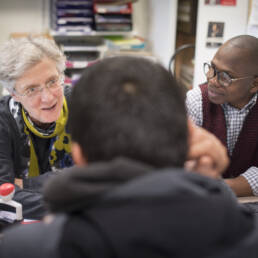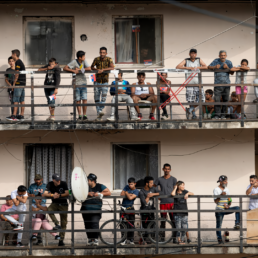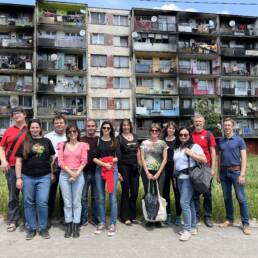Download the full report
…young people have a critical role. They are not the future of our peoples; they are the present. Even now, with their dreams and their lives they are forging the spirit of Europe. We cannot look to the future without offering them the real possibility to be catalysts of change and transformation. We cannot envision Europe without letting them be participants and protagonists in this dream.
Pope Francis, 2016, when he received the Charlemagne Prize
According to Eurostat, 1 out of 3 youth in Europe are suffering from the consequences of poverty. With the aim of providing a narrative to accompany existing statistical data compiled officially, the Caritas Europa network collected grass-roots information from its members that reflect the qualitative situation of young Europeans using the social services offered by European Caritas organisations in 16 countries. The findings are alarming as they document the rising exclusion of young men and women, emerging sentiments of intergenerational injustice, and a loudening claim that the European promise for equal opportunities and the levelling out of regional disparities is broken and in need of serious attention.
The aftermath of the 2008 financial crisis has hit certain groups of young people more heavily, for instance, single-parent families, migrants and refugees, Roma youth, and young people with disabilities, among others. The extent of the impact varies from one country to the next. But youth in the Southern and Eastern peripheries of Europe tend to face greater obstacles overall. This, in turn, has affected young women and men’s ability to access specific sets of social rights, such as housing, work and education.
What Caritas sees
Caritas social workers frequently observe that young people have difficulties in accessing housing. This delays an important step to adulthood. In the worst cases, this leads to youth homelessness. Caritas urges to guarantee the right to housing.
In the last decade, our social services have witnessed the European youth being deprived from the right to work and right to quality education. Although preventing school dropout has become a serious commitment, we still find that the transition from school to work is tedious, particularly for the children of disadvantaged families. Often, courses seem to be offered rather to sooth the statistics than to provide realistic upskilling pathways. Many school systems need to enhance permeability and second chance options.
I am 19 years old and I have been looking for a job for the past two years ago, to start an independent life. Only this year I found a job opportunity, but unfortunately, this a seasonal job and, in the winter, I will be unemployed again. It is becoming very hard for young people to have a secure life on a financial level, due to the lack of jobs and the ones that exist, most of them, are precarious. Caritas is helping my mother and me with some essential goods, like food, or some household expenses.
19-year-old beneficiary in the Diocesan Caritas of Algarve
Now, as the crisis seems to fade out, many youth are still trapped in unemployment. On the other hand, precarious work has risen, the promises of ‘flexicurity’ have not delivered, and increasingly more young people work, but remain poor. It is becoming particularly urgent to regulate the collaborative economy. With no place to stay and no income to spend, raising families of one’s own becomes a distant dream, giving rise to a new phenomenon, which we dubbed as “SINKies” – Single Income, No Kids. This refers to young working couples whose wages combined still barely equate the earnings equivalent to one single “decent” income.
In our social services, we see poverty-stricken families and have witnessed in the last decade that increasing numbers of people have been left behind by society. Caritas is alarmed to see that poverty is transmitted from one generation to the next with long-term negative impacts for young people. In many ways, the social status of the parents predicts the future of their children. The benefits of social mobility have been promised, but without fulfilment for many youth. This breach in promise results in weakening the European project, both socially and politically. The current lack of redistributional space brings the need for fairness and equity vehemently back to the agenda.
Another particular dimension of concern is indebtedness, which reduces the opportunities of young people for a lifetime. In addition, the exorbitant increase in the volumes of student loans leave a cumbersome legacy in the life plans of many young women and men. We see lasting social stigma, negatively affecting the poor, throughout European societies. Polarisation and growing inequality feed the phenomenon of blaming the most destitute families for their situation of poverty. The social climate has become rougher in the last decade.
Our findings indicate that the current situation of youth in Europe has wider and longer-term consequences for our societies, labour markets and social protection systems. As the number of single-parent families increases, social policies need to consider their specific situation and needs explicitly from the start. Better reconciliation of work and family life, and quality childcare is particularly important for mothers and fathers, also because it can foster equity from the start for all. Inclusion of migrant youth is a matter of justice and smart foresight. Promoting social investment and devising strategies to finance inclusive social protection systems, policies and programmes are vital for enabling cohesive environments and fostering migrant integration. European standards have been a beacon of hope for people with disabilities. Still, the processes of integration have fallen victim to austerity measures. Inclusive schools and protected labour markets are typically amongst the first in the line of budget cuts. Particularly in Eastern Europe we observe that non-discrimination practice towards persons with disabilities has become stuck.
Europe’s answer
On the other hand, Europe has reacted. The Youth Guarantee is a major plan against the youth employment crisis. Caritas lauds the rapid and decisive action taken by the European Institutions. However, we detect a certain fixation on employment and employability and recommend balancing activation with protection measures. In practice, European responses, such as the Youth Guarantee and the Youth Employment Initiative, do not always manage to reach out to highly marginalised groups. Implementation on the ground clearly lags behind the political commitments particularly in the quality of the offer. Furthermore, the focus on employability tends to oversee that in many cases previous work and investment in job-placement is necessary in terms of settling down, preparing the ground by developing certain skills and knowledge and regaining a sense of security. Furthermore, much of the Youth Guarantee seems to be geared towards quantity. Now that the economy again seems to be increasing its take up, it is time to correct this by guaranteeing the quality of employment and apprenticeships.
In the meantime, social services policies of Member States have an important impact on the well-being of young people. A common regulatory framework emerges in Europe on contracting social services. Whilst market forces strongly enter in the provision, with mixed results, the State is, without doubt, the duty-holder that ensures social rights. Therefore, it should never hand over the control over the services offered. Building partnerships with the third sector is essential.
In November 2017, European political leaders approved the European Pillar of Social Rights at the Gothenburg Social Summit and, thus, a new framework has been proposed to guarantee social standards. Caritas welcomes the synthesis this framework offers in order to define and measure the accomplishments of social rights across Europe. It should be strengthened by aligning policies to the existing Human Rights obligations, first and foremost the European Social Charter as the Social Constitution of Europe, and the commitments derived from the global Sustainable Development Goals (SDG) agenda.
Note: Data was compiled for AT, BE, BG, CY, CZ, DE, EL, FI, FR, IE, IT, LU, MT, PT, RO, and UK
More information
Peter Verhaeghe
Senior Policy and Advocacy Officer
Tel: +32 (0)2 235 03 96
Mob: +32 (0)478 58 54 33
pverhaeghe@caritas.eu




